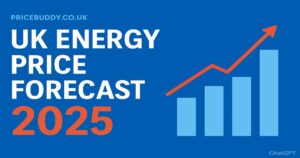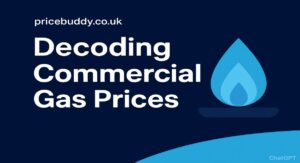In today’s unpredictable energy prices, understanding commercial gas prices is essential for growing as a business in the UK. Many existing and prospective entrepreneurs are trying to manage unpredictable energy costs and complex pricing structures, which impact their overall profitability.
This guide looks to examine how commercial gas pricing works, what the current market price is, and provides some tools to help you get the best possible gas pricing for your business in 2025.
Commercial Gas Overview: Understanding the Basics

What Is a Commercial Gas Price and Why Does It Matter?
A commercial gas price is the charge that businesses pay for the supply of natural gas that they use to power their business, named in kilowatt-hour (kWh).
- In comparison to domestic rates, commercial gas prices are extremely variable across business consumption, contract and terms, and market conditions.
- Business gas prices are one of the most significant components of business operational costs, which have a significant impact on business profitability.
- The business gas prices for 2025 are still approximately 200% of the cost businesses in the UK were paying before 2021, so managing costs has never been more important for businesses.
- When you understand your service provider’s commercial gas rates in UK, you can use that information to better budget and plan your strategy moving forward for your business.
- Some small businesses tend to pay a higher fixed per-unit gas price than larger businesses due to economies of scale.
Factors That Influence Commercial Gas Rates in the UK
Wholesale market prices are the basis for any commercial pricing. UK Gas was 80.65 GBp/thm in September 2025, an increase of 1.46% on the previous working day, signifying daily price volatility.
The region in which your business is located has a large bearing on your rates, due to the costs of supply and distribution across regions and the differences between infrastructure in the north of England compared to the south.
The volume of gas annually consumed will also strongly influence the rate structure. Typically, those who take the higher use will achieve better pricing per unit through bulk discounts and preset commercial contract terms.
How Do Commercial Gas Prices Work in the UK?
The pricing mechanism for commercial gas is complicated but straightforward, as it is based on a formula of the wholesale price loaded to include the supplier’s margin and associated regulatory costs (US). Recognizing how gas pricing works allows businesses to make better purchasing decisions.
1. Fixed vs Variable Pricing Plans for Commercial Gas
- Fixed commercial gas pricing plans clearly provide stability of rate for contract length and provide some protection against escalating rates during market volatility.
- Fixed plans provide the greatest opportunity for savings when anticipating the market to increase, or when a budget is needed or established.
- Variable rates are based on a wholesale-market dynamics basis, fluctuating and representing potential savings should wholesale prices decrease.
2. The Energy Suppliers Priced
- Energy suppliers, once obtaining or securing a wholesale price from the market, mark up their selling price to recover costs and provide a profit margin.
- After market price considerations, suppliers compete for business by pricing, their service, and their bottom line.
- As wholesale prices fluctuate based on demand, different suppliers have different plans, which can be lower than others based on their purchasing model and targets.
- Some suppliers target small or very large industrial gas consumers, while others may provide a competitive price for businesses or commercial use.
3. Gas Price Fluctuations Based on Demand and Seasonality
- The winter season typically creates the most demand for gas throughout the country and sends prices to upper levels of their range.
- The warm summer months generally have lower rates due to a seasonal decrease in residential and commercial demand.
- Supply and demand have a sort of cyclic aspect to them, and expected economic conditions could play a factor in overall consumption, price, and gas trends throughout the year.
Therm vs kWh: Measuring Commercial Gas Usage Accurately
What is a Therm?
A therm measures the energy content of natural gas. It is the equivalent of 100,000 British Thermal Units (BTU), and it is a traditional unit of measurement that originated in the gas industry and is still widely used in wholesale markets.
For business owners, therm vs kWh commercial gas calculations can be confusing. One therm is equivalent to around 29.3 kWh; however, this conversion figure will differ based on the calorific value of the gas.
What is a kWh?
A kilowatt-hour (kWh) measures energy consumption based on metric units. It is the billing unit that is used by commercial gas customers in the UK and creates a consistent method of billing and measurement, regardless of fuel type.
How do therms compare to kWh?
One therm contains approximately 29.3 kWh of energy. This figure can vary slightly, depending on the quality of the gas. Understanding this difference is important for comparison purposes when dealing with suppliers’ quotes and standard market pricing.
Why kWh is the standard Measurement in the UK
In the UK, meters must measure gas in kilowatt-hours for consistency – most energy companies have other business/commercial gas accounts in the kWh unit. It ensures we can all have a benchmark for managing energy across other utilities and multiple UK locations.
Converting therms to kWh for business energy bills
For an approximate conversion of therms to kWh, multiply your therm consumption by the number of therms (roughly 29.3). However, to calculate an exact amount, note your gas supplier’s calorific value, which is generally provided on a monthly bill.
Current Commercial Gas Prices in the UK: What Businesses Should Expect

Average Business Gas Prices in 2025
At the moment, one year fixed contract prices for small, medium, and large businesses are in the region of 6p per kWh from the major suppliers. But prices can vary dramatically depending on the situation.
Current commercial gas prices in the UK are showing signs of stabilizing after the volatility of the last few years. Small business customers (that have consumption levels between 10,000-50,000 kWh) are currently enjoying average prices of 9.0 p/kWh, compared to the previous high in 2022 of 16.3p/kWh.
Medium sized businesses usually receive better prices due to increased consumption, whilst larger customers tend to receive a personalized price when negotiating with the gas supplier directly.
Regional Differences
Price-wise, the Northern regions will see a slightly lower cost of gas around 3% on average, with gas prices being cheaper due to their proximity to gas fields and significant infrastructure pipelines.
Historically, London and the Southeast will tend to have a higher cost of gas, often as a result of distribution charges to pricing.
These price differences within the UK’s gas market tend to be around a 5-15% difference in pricing between the lowest and highest price of gas in the above regions and prices to consume gas within the UK.
Best Commercial Gas Prices in 2025
When trying to secure the most competitive rates, it is essential to know the well-understood trends with respect to current market conditions and timing your contracts correctly.
Which trends are influencing business gas prices in 2025?
Stabilized market conditions after a lot of volatility provide opportunities for long-term contracts.
The cheapest supplier in our sample set was Smartest Energy at an average annual cost of £1,482.23, a two-year contract starting August 1, 2025, for a business with a consumption of 25,000 kWh of commercial gas per year.
The pricing structures change pending the supplier’s integration of renewable energy into their supply. The future trend in long-term price terms will be influenced by government policy on carbon pricing and environmental regulations.
How to Lock in the Best Commercial Gas Rates
Competitive tendering processes are generally the best pathway to obtaining the most advantageous gas prices in 2025.
As your contract expiration nears, have suppliers quote to have ample negotiating power at your fingertips. Considering this, contracting at a specific period is very important when costs generally increase based on seasonality.
Comparing Commercial Gas Rates in the UK: Finding the Right Deal for Your Business

The Importance of Comparing Business Gas Quotes
- Differences in rate mean annual savings could reach thousands of dollars.
- Even a single cent per kWh savings matters for an organization’s overall costs.
- If your contract is the typical 1-3 years, it can quickly add up.
- Typically, suppliers consider more than just the actual price of energy in the contract.
- Payment terms, exit clauses, and service levels.
- More can all impact the total cost of ownership beyond the headline rates.
Online Tools for Checking Commercial Gas Price
- There are multiple websites for checking business gas prices online.
- They will generate a range of rate tiers based on consumption data to come up with an estimated price.
- For accurate pricing for commercial rates, you will need to commence a formal tender process to gain comprehensive quotes.
Negotiating Better Rates with Suppliers
- While negotiating with gas suppliers, you can provide multiple rates to facilitate competitive pricing.
- You can leverage your payment history.
- Also, a positive experience with the supplier over time and partnership when negotiating pricing agreements.
When to Change Suppliers for Maximum Savings
- Changing the timing of your gas contract can impact both the rates provided as well as the terms of the contract.
- You typically want to begin the renewal process 6-12 months in advance of the expiry date.
- Contract to achieve the best pricing rather than rolling into the old rates.
FAQ
What is the most significant factor influencing commercial gas pricing?
Above all, commercial gas rates are determined by wholesale market prices and the quantity of gas purchased annually.
How often does the commercial gas price change?
If you select a fixed-rate contract, your price will remain constant for the duration of your contract. A variable rate contract means your rate may change monthly, based on market conditions.
What is the difference between commercial and residential gas pricing?
Commercial gas pricing may provide a better “per kWh rate” for larger gas consumption relative to residential pricing; however, commercial gas contracts/costs seldom disclose the service charges and complexities in the contract terms.
What is the best contract length for commercial gas?
Often, a 2-3 year term balances competitive pricing and flexibility, but that will also depend on the type of business entity you have and various other related factors.
Can small businesses get competitive commercial gas pricing?
Yes, while interest rates will generally improve for larger gas consumption, small businesses can get competitive pricing by joining consortiums which can provide a group purchase price.
Conclusion
By understanding commercial gas prices, smart energy procurement decisions can be taken that can affect the cost of business significantly. In this guide, we addressed the logic behind important pricing structures, where to see current pricing levels, and best practices to help find competitive rates in the evolving energy market we currently find ourselves in 2025. Smart businesses take advantage of these strategies to get meaningful value out of their energy spend while staying competitive.
If you need help navigating commercial gas prices and finding the best price for your business, visit Price Buddy, your trusted partner for energy procurement solutions.












